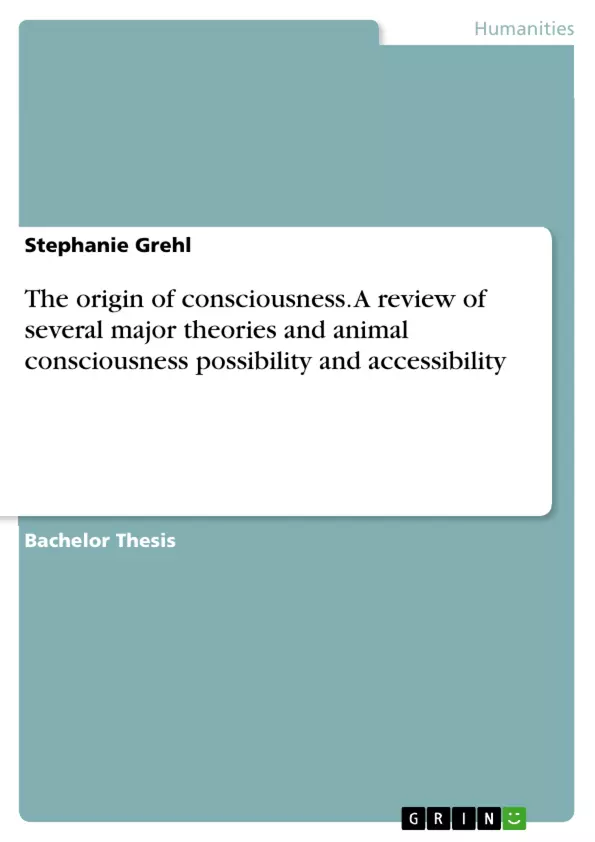The origin of consciousness has come into main focus recently and is a widely discussed and controversial topic. This paper gives an overview of some of the most important theories of the origin of consciousness, including evolutionary and functional theories of consciousness emergence, theories of consciousness to be an optional extra and the idea of consciousness emergence by being not separable from higher-order functions. However, it will be shown that every theory faces its own, severe problems, which do not seem to be solvable in the near future. Furthermore, is the possibility and accessibility of non-human consciousness examined, with an emphasis on animal consciousness accessibility. It is shown that this question is also difficult to answer due to several limitations and further research is suggested.
Inhaltsverzeichnis (Table of Contents)
- INTRODUCTION
- EMERGENCE OF CONSCIOUSNESS
- Evolutionary theories of consciousness
- Introduction of Darwinian evolution
- the possibility of Darwinian evolution of consciousness by examining the question of the function of consciousness
- ZOMBIES: CONSCIOUSNESS AS AN OPTIONAL EXTRA
- NOT SEPARABLE FUNCTIONS
- Evolutionary theories of consciousness
- WHO AND WHAT IS CONSCIOUS?
- HUMAN CONSCIOUSNESS
- ANIMAL CONSCIOUSNESS
- Importance of the question of animal consciousness
- Self-awareness
- Theory of mind
- Language and suffering
- CONCLUSION
Zielsetzung und Themenschwerpunkte (Objectives and Key Themes)
This paper aims to provide an overview of the most prominent theories regarding the origin of consciousness. It delves into evolutionary and functional theories of consciousness emergence, explores the idea of consciousness as an optional extra, and investigates the concept of consciousness arising from inseparable higher-order functions. Additionally, the paper examines the possibility and accessibility of non-human consciousness, particularly focusing on animal consciousness.
- Evolutionary theories of consciousness
- Functional theories of consciousness emergence
- Consciousness as an optional extra
- Consciousness arising from inseparable higher-order functions
- Accessibility of non-human consciousness, specifically animal consciousness
Zusammenfassung der Kapitel (Chapter Summaries)
- Introduction: This section provides an overview of the recent surge in scientific interest surrounding consciousness. It highlights the difficulty in defining consciousness and explores various perspectives on its nature and the mind-body problem. It mentions different theories like dualism, epiphenomenalism, physicalism, and functionalism, showcasing the complexities of consciousness research.
- Emergence of Consciousness: This chapter delves into evolutionary theories of consciousness, particularly focusing on Darwin's theory of natural selection. It explains how this theory can be applied to the emergence of consciousness and discusses the function of consciousness in evolutionary terms.
- Zombies: Consciousness as an Optional Extra: This chapter explores the possibility of a world where beings lack conscious experience (zombies). It examines the arguments for and against this view and considers the implications for understanding the nature of consciousness.
- Not Separable Functions: This chapter presents the idea that consciousness emerges as a consequence of higher-order cognitive functions and is not a separate entity. It examines the relationship between consciousness and these functions and explores the implications for our understanding of its emergence.
- Who and What is Conscious?: This chapter focuses on the question of human and animal consciousness. It highlights the significance of understanding animal consciousness and explores various aspects of consciousness in non-human animals, including self-awareness, theory of mind, language, and suffering.
Schlüsselwörter (Keywords)
The core concepts and themes explored in this thesis include consciousness, its origin, evolutionary theories, functionalism, dualism, epiphenomenalism, physicalism, animal consciousness, self-awareness, theory of mind, language, suffering, and the mind-body problem. These keywords encapsulate the central topics and research focus of the work, highlighting the interdisciplinary nature of consciousness research.
Frequently Asked Questions
What are the main theories on the origin of consciousness?
The paper discusses evolutionary theories, functionalist perspectives, and the idea that consciousness is an inseparable part of higher-order cognitive functions.
Can consciousness be explained by Darwinian evolution?
Evolutionary theories suggest consciousness emerged through natural selection because it provided a functional advantage for survival, though the exact mechanism remains debated.
What is the "zombie" argument in consciousness studies?
It explores the philosophical possibility of beings that act like humans but lack internal conscious experience, questioning if consciousness is an "optional extra."
Do animals possess consciousness according to this research?
The paper examines animal consciousness through indicators like self-awareness, theory of mind, and the capacity for suffering, while noting the difficulty of direct accessibility.
What is the "theory of mind" in relation to animals?
It refers to the ability of an individual to attribute mental states—like beliefs or intents—to themselves and others, a key marker for advanced consciousness.
- Citar trabajo
- Stephanie Grehl (Autor), 2006, The origin of consciousness. A review of several major theories and animal consciousness possibility and accessibility, Múnich, GRIN Verlag, https://www.grin.com/document/459590



